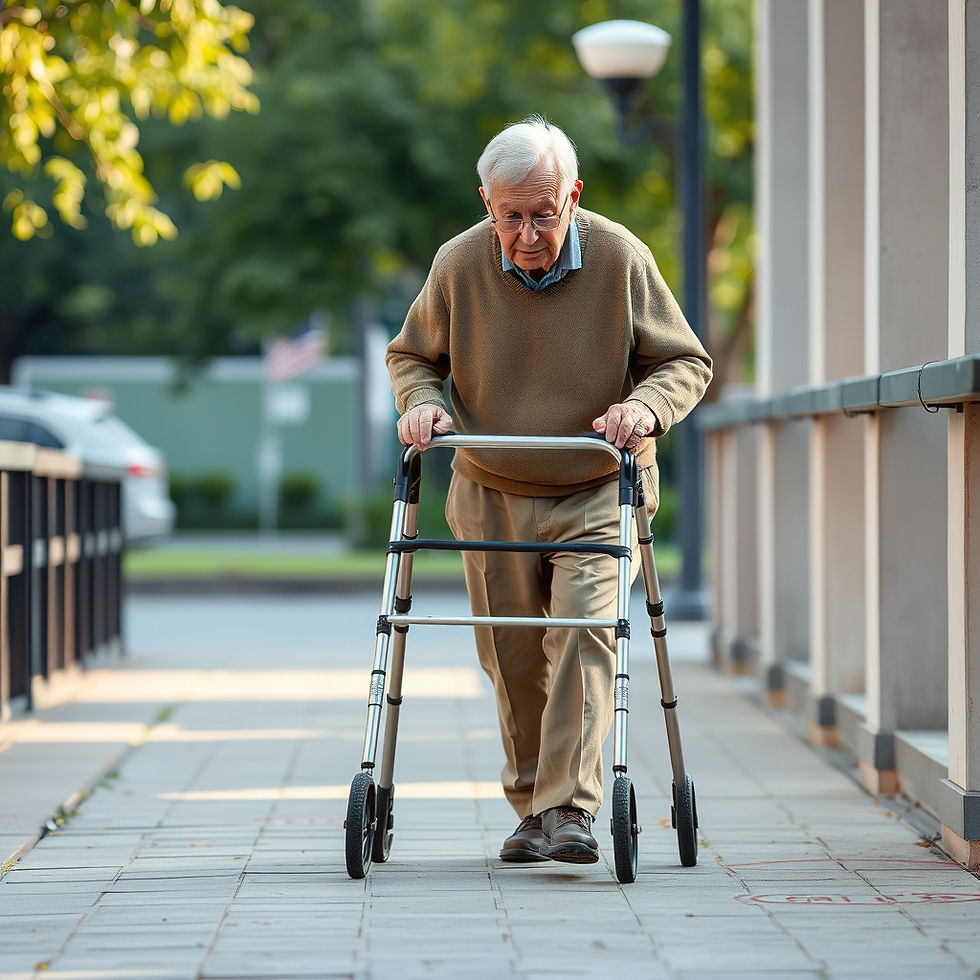Understanding Your Risk for Falls
- Amy Genson

- Oct 22, 2025
- 3 min read

Millions of people have serious injuries from falls each year. It is important to understand your risk of falling. Talk with your health care provider about your risk and what you can do to lower it.
If you do have a serious fall, make sure to tell your health care provider. Falling once raises your risk of falling again.
How can falls affect me?
Serious injuries from falls are common. These include:
- Broken bones, such as hip fractures
- Head injuries, such as traumatic brain injuries (TBI) or concussions
A fear of falling can cause you to avoid activities and stay at home. This can weaken your muscles, in turn increasing your risk for a fall.
What can increase my risk of falling?
There are a number of risk factors that increase your risk for falling. The more risk factors you have, the higher your risk of falling. Serious injuries from a fall happen most often to people who are older than 65 years old.
Common risk factors include:
- Weakness in the lower body
- Being generally weak or confused due to chronic illness
- Dizziness or balance problems
- Poor vision
- Medicines that cause dizziness or drowsiness. These may include:
o Medicines for your blood pressure, heart, anxiety, insomnia or edema
o Pain medicines
o Muscle relaxants
Other risk factors include:
- Drinking alcohol
- Having had a fall in the past
- Having foot pain or wearing improper footwear
- Having any of the following in your home:
o Tripping hazards, such as floor clutter or loose rugs
o Poor lighting
o Pets
- Having dementia or memory loss
What actions can I take to lower my risk of falling?
Physical activity
Stay physically fit. Do strength and balance exercises. Consider taking a regular class to build strength and balance. Yoga and tai chi are good options. You can also reach out to Genson Geriatrics regarding our FUNdamentals program.
Vision
Have your eyes checked every year and your prescription for glasses or contacts updated as needed.
Shoes and walking aids
- Wear non-skid shoes
- Wear shoes that have rubber soles and low heels
- Do not wear high heels
- Do not walk around the house in socks or slippers
- Use a cane or walker as told by your provider
Home safety
- Attach secure railings on both sides of your stairs
- Install grab bars for your bathtub, shower and toilet. Use a non-skid mat in your bathtub or shower. Attach bath mats securely with double-sided, non-slip rug tape
- Use good lighting in all rooms. Keep a flashlight near your bed
- Make sure there is a clear path from your bed to the bathroom. Use night-lights
- Do not use throw rugs. Make sure all carpeting is taped or securely tacked down
- Remove all clutter from walkways and stairways, including extension cords
- Repair uneven or broken steps and floors
- Avoid walking on icy or slippery surfaces. Walk on the grass instead of on icy or slick sidewalks
- Use a cordless phone
Questions to ask your health care provider
- Can you help me check my risk for a fall?
- Do any of my medicines make me more likely to fall?
- Should I take a vitamin D supplement?
- What exercises can I do to improve my strength and balance?
- Should I make an appointment to have my vision checked?
- Do I need a bone density test to check for osteoporosis?
- Would it help to use a cane or a walker?
Where to find more information
- Centers for Disease Control and Prevention, STEADI: www.cdc.gov
- Community-Based Fall Prevention Programs: www.cdc.gov
- National Institute on Aging: www.nia.nih.gov
Contact a health care provider if:
- You fall at home
- You are afraid of falling at home
- You feel weak, drowsy or dizzy
This information is not intended to replace advice given to you by your health care provider. Make sure you discuss any questions you have with your health care provider.




Comments